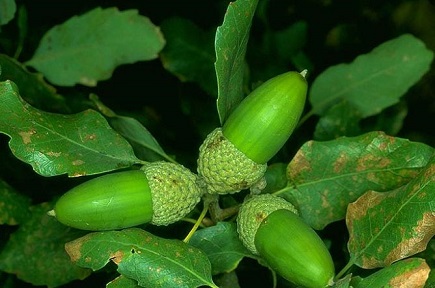Thailand medical researchers discover Nutgalls from Quercus infectoria speed up wound healing
Nikhil Prasad Fact checked by:Thailand Medical News Team Sep 09, 2024 1 year, 4 months, 4 weeks, 1 day, 1 hour, 44 minutes ago
Thailand Medical: Researchers from Prince of Songkla University in Songkhla, Thailand, have made an exciting discovery that could significantly improve wound healing, especially for those suffering from chronic wounds like diabetic ulcers. The team focused their study on the traditional herbal remedy known as nutgalls, specifically from Quercus infectoria (a type of oak tree). This plant has been used in traditional medicine across Asia for centuries, but the scientific backing behind its effectiveness is now coming to light. This
Thailand Medical News report will explore the groundbreaking findings of the research and how the extracts from Quercus infectoria can accelerate the wound healing process through their anti-inflammatory and antioxidant properties.
 Thailand medical researchers discover Nutgalls from Quercus infectoria speed up wound healing
What Are Nutgalls?
Thailand medical researchers discover Nutgalls from Quercus infectoria speed up wound healing
What Are Nutgalls?
Nutgalls are abnormal growths on oak trees caused by insects laying their eggs on the tree's branches. These galls contain powerful bioactive compounds, including tannic acid, which has been used in traditional medicine to treat wounds, infections, and other health issues. In many cultures, especially in Thailand, nutgalls have long been recognized for their ability to heal skin conditions. However, until recently, the mechanisms behind their wound healing properties were not fully understood.
The Research Study: Focus on Oxidative Stress and Inflammation
The team at Prince of Songkla University, including experts from the Faculty of Science and the Faculty of Medical Technology, focused their study on how Quercus infectoria nutgall extracts affect oxidative stress and inflammation - two key factors that delay the healing of wounds. Oxidative stress occurs when there is an imbalance between free radicals (harmful molecules) and antioxidants in the body, leading to damage to cells and tissues. Chronic wounds, such as those seen in diabetic patients, are often exacerbated by oxidative stress and prolonged inflammation.
The researchers used fibroblast cells (L929 cells) treated with hydrogen peroxide (H2O2) as a model to simulate oxidative stress in the skin. The study found that the nutgall extract exhibited strong antioxidant properties, reducing oxidative stress and inflammation in the cells. These effects were observed through various laboratory assays, including the 2,2-diphenyl-1-picrylhydrazyl (DPPH) assay and ferric reducing antioxidant power (FRAP) assay. The results showed that the extract could significantly improve cell viability and reduce the damage caused by oxidative stress.
How Nutgalls Accelerate Wound Healing
The key finding of the study was that the Quercus infectoria gall extract accelerated the wound healing process by reducing oxidative damage and inflammation. The researchers found that the nutgall extract significantly improved wound closure rates in fibroblast cells, which play a critical role in the wound healing process by producing collagen and other extracellular matrix components.
When the fibroblast c
ells were exposed to H2O2, a significant reduction in cell viability was observed, as the oxidative stress damaged the cells. However, when the cells were treated with the nutgall extract, cell viability increased, and the cells were better able to survive and function, even under oxidative stress. The extract also reduced the production of reactive oxygen species (ROS), which are harmful molecules that contribute to inflammation and cell damage.
One of the most promising aspects of the study was the extract’s ability to mitigate the inflammatory response in the cells. Chronic inflammation is a major factor in delayed wound healing, as it prevents the body from progressing through the normal stages of healing. The nutgall extract was able to reduce the expression of several pro-inflammatory genes, including Tnfa and Il1a, in the fibroblast cells. This anti-inflammatory effect likely plays a significant role in the extract's ability to promote faster wound healing.
The Role of Tannic Acid and Other Compounds
The main active ingredient in Quercus infectoria nutgalls is tannic acid, which makes up 50-70% of the extract. Tannic acid is a powerful antioxidant and anti-inflammatory compound that has been used in traditional medicine for centuries. In addition to tannic acid, the nutgalls contain several other bioactive compounds, including phenolic acids and flavonoids, which may also contribute to the extract’s therapeutic effects.
The researchers noted that the combination of these bioactive compounds likely has a synergistic effect, meaning that the compounds work together to produce a stronger therapeutic effect than any one compound alone. This is an important consideration when developing new treatments, as it suggests that using whole plant extracts may be more effective than using isolated compounds.
The Potential for Treating Chronic Wounds
Chronic wounds, such as diabetic ulcers, are a major healthcare issue worldwide. These wounds are often difficult to treat and can lead to serious complications, including infections and amputations. The findings of this study suggest that Quercus infectoria nutgall extract could be developed into a new treatment for chronic wounds, offering a natural and effective alternative to current therapies.
The fact that the extract is derived from a traditional herbal remedy used for centuries adds to its appeal, as it has a long history of safe use. The next step for the researchers will be to conduct clinical trials to determine whether the extract can be used safely and effectively in humans.
Conclusion
The discovery that Quercus infectoria nutgalls can accelerate wound healing by reducing oxidative stress and inflammation is a significant breakthrough. This natural remedy, long used in traditional medicine, may hold the key to developing new treatments for chronic wounds and other skin conditions. The study findings have shown that the nutgall extract not only improves cell survival and function under oxidative stress but also reduces inflammation, a key factor in delayed wound healing.
The study findings were published in the peer-reviewed journal: Antioxidants.
https://www.mdpi.com/2076-3921/13/9/1094
For the latest Thai research news, keep on logging to Thailand
Medical News.
Read Also:
https://www.thailandmedical.news/news/lincrna-eps-could-revolutionize-wound-care-for-the-elderly-new-insights-on-skin-healing
https://www.thailandmedical.news/news/herbs-and-phytochemicals-malaysian-scientists-using-cassia-alata-to-revolutionize-wound-healing
